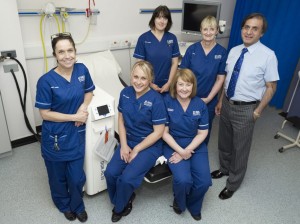 A Good Hope consultant has won international recognition for leading a new treatment study – thought to be the largest prospective study reported anywhere in the world – for patients with superficial bladder cancer.
A Good Hope consultant has won international recognition for leading a new treatment study – thought to be the largest prospective study reported anywhere in the world – for patients with superficial bladder cancer.
By using a piece of equipment known as a holmium YAG laser, Mr Haider Syed, consultant urological surgeon, and his team have been able to perform a new surgical procedure which is less invasive on those suffering from recurrent bladder cancer. As a result, patients have a walk-in procedure rather than having to stay in overnight and make a quicker recovery. The surgery is undertaken with local anaesthetic rather than general and patients experience minimal complications. The patient data collected from patients over the past six years of the study also shows significantly improved results in patient experience when compared with the conventional treatment given under general anaesthetic.
Mr Syed says: “The study has been overwhelmingly positive and has huge implications for the future treatment of superficial bladder cancer. We looked at all aspects of the treatment techniques – everything from patient satisfaction, local re-occurrence and pain score to cost savings for the Hospital and there are break through improvements in all areas. By specialising in and studying these treatment techniques for such a significant period of time, Good Hope is now setting the standards nationally in this area. My hope is that the study can set the trend for the rest of the NHS and the world to follow to the great benefit of our patients.”
Mr Syed’s bladder cancer work has won recognition in Europe at the European Annual Urology Meeting in Vienna, from the British Association of Urological Surgeons, and more recently, at an international level at the World Congress EndoUrology 2012.






